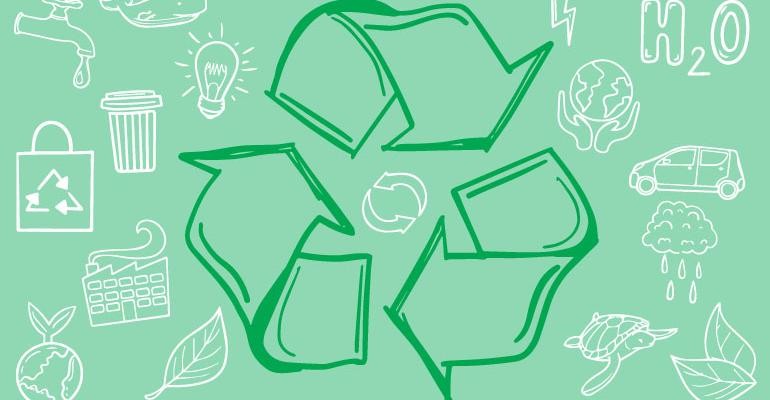
Waste Not, Want Not: Recycled vs. Recyclable
This past weekend, at a gathering with friends, the topic of recycling came up.
“Did you know that they can recycle cigarette butts now?”
Being known as the “garbage man” among my peers, eyes turned to me to confirm this seemingly revolutionary advancement in recycling.
I hesitated, knowing that my answer was about to make me a “Debbie Downer” and open a can of worms about what it really means to recycle something.
“No – cigarette butts cannot be recycled in conventional recycling systems” – I made sure to add the latter as a qualifier.
“But I heard about a program that takes back used cigarettes and turns it into new forms of plastic and compost!”
What my friend was referring to was the breakthrough program offered by Terracycle (read more about it here: https://www.terracycle.com/en-US/brigades/cigarette-waste-recycling).
And with a heavy heart, I launched into a lecture about the difference between something that can be recycled, versus something that is recyclable.
By the end, the disappointment in the room was palpable – I was the proverbial wet blanket that ruined the “feel good factor” of trying to do the right thing.
My feelings towards Terracycle and other similar organizations are heavily conflicted. On one hand, they are innovative, transformative and committed to finding new uses for problematic materials. The accolades they receive are well deserved, but I also think it creates a dangerous perception among the public about what items can (and should be) recycled.
Most materials can technically be recycled – be it cigarette butts, laminated coffee cups, chip bags etc. Given the resources, infrastructure, technology and time, we can find ways to re-purpose problematic materials.
It is in this space that organizations such as Terracycle thrive – they have forged literally dozens of partnerships with companies across the globe to successfully “recycle the unrecyclable”.
Win, win situation, right? Wrong.
While it may seem novel to turn ocean plastic into shoes, or chip bags into handbags, the hard truth is that this type of recycling cannot be readily replicated at scale. The processing technology involved is economically prohibitive, and really only available in jurisdictions in which the collection program is being offered.
The latter point is also why the environmental and economic impact of a decentralized logistics network is questionable – take back programs that ask consumers to ship things like coffee pods, chip bags, razors etc. hundreds of kilometers can be both inefficient and costly.
Going back to our cigarette butt example, there is no recycling facility in Canada (that I am aware of) that can economically recover the material… which is why it is so imperative that we distinguish between something that can be recycled, versus recyclability.
To me, the former is a technical question – does the technology exist to recycle a particular good? The latter however is a much more nuanced question that requires us to consider the economic, environmental and social impact of recycling activity.
As an example, 99.99% of people who work in waste will tell you that glass can be recycled, but I would bet that a significant portion of those people would question whether it should really be recycled (at least in a curbside collection system).
Why this matters is that the average consumer has difficulty differentiating between recycling and recyclability. Much like my well intentioned friends, once people hear that something can be recycled, they assume that to be a universal truth. When Keureg teamed up with Recycle BC to pilot a recycling program, people across the country thought that they could now put K-cups in their Blue Bin (which was never the case).
Perhaps a more insidious example of how this consumer confusion can result in catastrophe, is in the green washing of packaging. My social media feed is full of examples of CPG companies partnering with Terracycle (and others) to pilot new recycling programs. The dangers of this is that companies may be more concerned with the “optics” of recyclability, as opposed to developing products that can be sustainability managed at end of life. The key to a successful pilot is accountability and transparency – I don’t want a headline announcing a partnership, I want to know how much is being diverted, where it is being diverted and at what cost.
I want to impress upon the reader that this post is not about bashing Terracycle or any other company attempting to develop new ways to recycle problematic materials. Their work is critical in promoting consumer awareness, and has successfully married CPG companies and recyclers to work collaboratively.
However, we have to remember that recycling is only one of many tools we have to promote a circular system. Inordinately focusing our attention and resources on recycling may be at the expense of other, more sustainable options. Consumers have an intense appetite and interest in doing the right thing and keeping material out of landfills, but we have to be honest with both them and ourselves regarding the role recycling can play.
Senior Manager - Building Performance Maintenance & Logistics at Toronto Catholic District School Board
4yNicely said!!
General Manager at Yukon Seed and Restoration
4yThanks for your explanation! As someone who is concerned about plastics in our environment, it is good to have some perspective.
Owner, sonnevera international corp.
4yThanks, Calvin. You raise some critical points. I also find myself with very conflicted feelings about programs like the TerraCycle ones referenced.
Will County, Chairman at Illinois Product Stewardship Council 2016-2024, President IRF Board 2020-2023, NRC Board, ShareFest Board, New Lenox Safe Communities. TCF Will County Advisory Council, Past-Pres IRA Board
4yYou are not a wet blanket. You endeavor to offer people a chance to think critically. Unfortunately, that is not something most people wish to do anymore.
Mostly retired. Will support requests for assistance on sustainability projects.
4yvery helpful commentary....